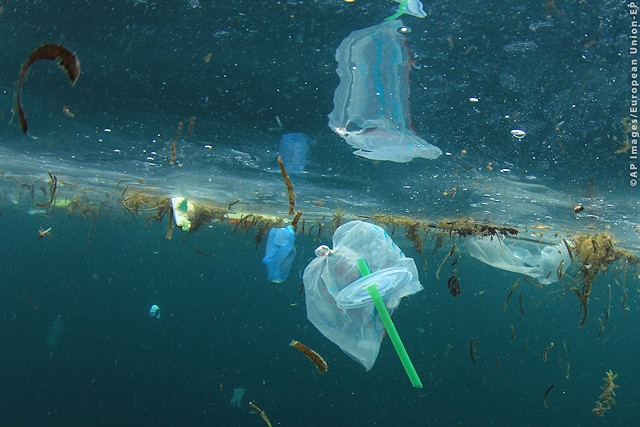Sweeping ban on throwaway plastics by 2021 backed by European parliament
Date published: 25 October 2018

Photo: AP images/European Union -EP
Parliament wants to forbid throwaway plastics from 2021
Single-use plastic items such as plates, cutlery, straws, balloon sticks or cotton buds, will be banned in the EU under plans adopted on Wednesday (24 October).
These products, which make up over 70% of marine litter, will be completely banned from the EU market from 2021, under draft plans approved by the European Parliament.
The EU hopes it will clear procedural hurdles and be in effect by 2021.
According to the BBC, the UK will also have to incorporate the rules into national law if the ban becomes a fully-fledged directive before the end of a Brexit transition period.
After the Parliament vote was backed by 571-53, the MEP responsible for the bill, Frédérique Ries, said: “We have adopted the most ambitious legislation against single-use plastics. It is up to us now to stay the course in the upcoming negotiations with the Council, due to start as early as November.
“The vote paves the way to a forthcoming and ambitious directive. It is essential in order to protect the marine environment and reduce the costs of environmental damage attributed to plastic pollution in Europe, estimated at 22 billion euros by 2030.”
What is being banned?
In May this year, the European Commission proposed EU-wide rules to target the ten single-use plastic items most commonly found on Europe’s beaches, as there are readily available alternatives such as cardboard containers and paper straws.
Products made of oxo-degradable plastics and fast-food containers made of expanded polystyrene were added to this list of plastics to be banned by MEPs.
Other items, for which no alternative exists, will have to be reduced by at least 25% by 2025. This includes single-use burger boxes, sandwich boxes or food containers for fruits, vegetables, desserts or ice creams.
MEPs agreed that reduction measures should also cover waste from tobacco products, especially cigarette filters containing plastic. Cigarette makers will have to reduce the plastic by 50% by 2025 and 80% by 2030.
One cigarette butt can pollute between 500 and 1,000 litres of water, and thrown on the roadway, it can take up to twelve years to disintegrate. They are the second most littered single-use plastic items.
Member states would have to ensure that tobacco companies cover the costs of waste collection for those products, including transport, treatment and litter collection. The same goes for producers of fishing gear containing plastic, who will need to contribute to meeting the recycling target.
Other plastics, such as beverage bottles, will have to be collected separately and recycled at a rate of 90% by 2025. Currently, bottles and their lids account for approximately 20% of all the sea plastic.
The problem with plastic
Since the 1950s, approximately 8.3 billion metric tonnes of plastic have been produced. Of this, just 9% is recycled, with an eye-opening 79% having been thrown away. The rest is incinerated – and, it is estimated by 2050, there will be more plastic than fish on the planet.
Aside from the finite landfill space, plastic is a blight on the very environment it pollutes, estimated to take anywhere up to 1,000 years for plastic to decompose in landfill.
A vast amount of plastic waste ends up in waterways and oceans, where it accumulates worldwide due to its slow rate of decomposition.
Breaking down into microplastics, tiny fragments (<5mm) of plastic particles, which has been found in marine species – such as sea turtles, seals, whales and birds, but also in fish and shellfish, and therefore in the human food chain.
Do you have a story for us?
Let us know by emailing news@rochdaleonline.co.uk
All contact will be treated in confidence.
Most Viewed News Stories
- 1The plan for two new apartment blocks with an unusual car parking system
- 2Andy Burnham responds to harrowing reports from hospital nurses
- 3Police seize £48,000 in Rochdale property search
- 4The museum undergoing £8.5m transformation now needs a new roof
- 5Residents urged to be vigilant after spike in Shawclough burglaries
To contact the Rochdale Online news desk, email news@rochdaleonline.co.uk or visit our news submission page.
To get the latest news on your desktop or mobile, follow Rochdale Online on Twitter and Facebook.

